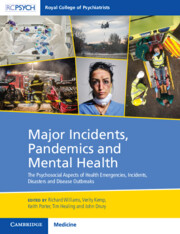 Major Incidents, Pandemics and Mental Health
Major Incidents, Pandemics and Mental Health Book contents
- Major Incidents, Pandemics and Mental Health
- Major Incidents, Pandemics and Mental Health
- Copyright page
- Dedication
- Contents
- Figures
- Tables
- Boxes
- Contributors
- Foreword by Dr Adrian James
- Foreword by Professor David Lockey
- Section 1 The Nature and Impacts of Twenty-First-Century Healthcare Emergencies
- Section 2 Clinical Aspects of Traumatic Injuries, Epidemics, and Pandemics
- Section 3 The Role of the Public in Emergencies: Survivors, Bystanders, and Volunteers
- Section 4 Responses to Meet the Mental Health Needs of People Affected by Emergencies, Major Incidents, and Pandemics
- Section 5 Sustaining and Caring for Staff During Emergencies
- Chapter 37 The Moral Architecture of Healthcare Systems and Other Organisations
- Chapter 38 What Ails Professional Responders, and the Implications for Training and Sustaining Healthcare Practitioners
- Chapter 39 Moral Distress and Moral Injury
- Chapter 40 Consequences for the Mental Health of Families of Responders to Pandemics, Major Incidents, and Emergencies
- Chapter 41 Lessons for Structure, Workforce Planning, and Responding to Emergencies from Nurses in the COVID-19 Pandemic
- Chapter 42 Intelligent Kindness Under Stress: Working with Intensive Care Unit (ICU) Staff During The Pandemic
- Chapter 43 The Role of Occupational Health Services and Responding to Staff Who Have Long COVID
- Chapter 44 A Framework for Designing, Developing, and Delivering Psychosocial and Mental Healthcare
- Chapter 45 Case Study 1: Caring for Teams – An Organisation-Wide Approach to Wellbeing, Psychosocial Care, and Mental Healthcare
- Chapter 46 Case Study 2: The Impacts of COVID-19 on Healthcare Staff – Lessons from a Selection of Interventions Put in Place During the Pandemic
- Chapter 47 Case Study 3: Lessons from Delivering Support for Staff Working at the Nightingale COVID-19 Hospital in London
- Chapter 48 Case Study 4: Delivering Peer Support
- Section 6 Designing, Leading, and Managing Responses to Emergencies and Pandemics
- Section 7 Key Lessons for the Way Forward
- A Glossary of Selected Key Terms Used in This Book
- Index
- References
Chapter 45 - Case Study 1: Caring for Teams – An Organisation-Wide Approach to Wellbeing, Psychosocial Care, and Mental Healthcare
from Section 5 - Sustaining and Caring for Staff During Emergencies
Published online by Cambridge University Press: 11 January 2024
- Major Incidents, Pandemics and Mental Health
- Major Incidents, Pandemics and Mental Health
- Copyright page
- Dedication
- Contents
- Figures
- Tables
- Boxes
- Contributors
- Foreword by Dr Adrian James
- Foreword by Professor David Lockey
- Section 1 The Nature and Impacts of Twenty-First-Century Healthcare Emergencies
- Section 2 Clinical Aspects of Traumatic Injuries, Epidemics, and Pandemics
- Section 3 The Role of the Public in Emergencies: Survivors, Bystanders, and Volunteers
- Section 4 Responses to Meet the Mental Health Needs of People Affected by Emergencies, Major Incidents, and Pandemics
- Section 5 Sustaining and Caring for Staff During Emergencies
- Chapter 37 The Moral Architecture of Healthcare Systems and Other Organisations
- Chapter 38 What Ails Professional Responders, and the Implications for Training and Sustaining Healthcare Practitioners
- Chapter 39 Moral Distress and Moral Injury
- Chapter 40 Consequences for the Mental Health of Families of Responders to Pandemics, Major Incidents, and Emergencies
- Chapter 41 Lessons for Structure, Workforce Planning, and Responding to Emergencies from Nurses in the COVID-19 Pandemic
- Chapter 42 Intelligent Kindness Under Stress: Working with Intensive Care Unit (ICU) Staff During The Pandemic
- Chapter 43 The Role of Occupational Health Services and Responding to Staff Who Have Long COVID
- Chapter 44 A Framework for Designing, Developing, and Delivering Psychosocial and Mental Healthcare
- Chapter 45 Case Study 1: Caring for Teams – An Organisation-Wide Approach to Wellbeing, Psychosocial Care, and Mental Healthcare
- Chapter 46 Case Study 2: The Impacts of COVID-19 on Healthcare Staff – Lessons from a Selection of Interventions Put in Place During the Pandemic
- Chapter 47 Case Study 3: Lessons from Delivering Support for Staff Working at the Nightingale COVID-19 Hospital in London
- Chapter 48 Case Study 4: Delivering Peer Support
- Section 6 Designing, Leading, and Managing Responses to Emergencies and Pandemics
- Section 7 Key Lessons for the Way Forward
- A Glossary of Selected Key Terms Used in This Book
- Index
- References
Summary
This case study illustrates approaches to promoting the wellbeing of and initiating psychosocial care to support the mental health of the staff of public sector services in the UK. It focuses on staff who work in emergencies, including in the fire and rescue, police, ambulance, and search and rescue services, often referred to in the UK as the Blue Light services. This case study provides information illustrating what can be done to assist the work of employing organisations to promote the mental health of all employees – that is, senior, middle, junior, general, and professional managers and their staff. It describes important concepts in planning and in delivering interventions.
- Type
- Chapter
- Information
- Major Incidents, Pandemics and Mental HealthThe Psychosocial Aspects of Health Emergencies, Incidents, Disasters and Disease Outbreaks, pp. 337 - 344Publisher: Cambridge University PressPrint publication year: 2024


